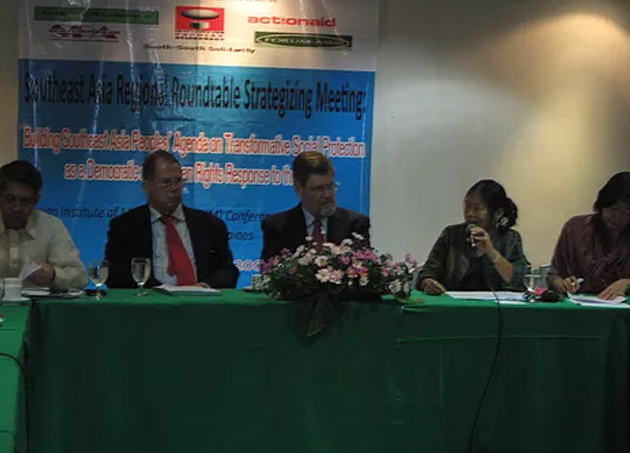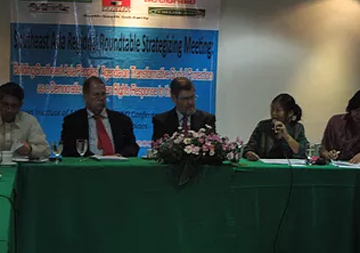Diplomats support transformative social protection drive; Campaign for life with dignity in ASEAN resonates with Europeans
November 9, 2009
MANILA, Philippines—The modern-day idea of transformative social protection sprang from the squalor of mid-nineteenth century Europe when standards for water supply, sewerage, and housing (elements to a decent life) were left to market forces, which kept them so degradingly, dangerously, and deadly low that reforms particularly on health became necessary.

Thus, ASEAN civil society’s long-term campaign for the inclusion of transformative social protection (TSP) in ASEAN agenda gains support from the Head of Delegation of the European Commission to the Philippines Ambassador Alistair MacDonald, Finnish Ambassador to the Philippines Heikki Hannikainen, and Foreign Affairs Assistant Secretary Eduardo J. Malaya.
The campaign resonates with Europeans, Ambassador Hannikainen told the newly formed Network on TSP.
The Network on TSP, which was created during the regional strategising meeting prior to the ASEAN People’s Forum and the ASEAN Summit, held a dialogue with diplomats from Europe and the Philippines on October 14, 2009 at the Asian Institute of Management Conference Center in Makati City.
Members of the Network, most who also form part of the Asia-Europe People’s Forum presented to the envoys a communiqué resulting from the Southeast Asia regional strategising meeting on TSP. The communiqué, among other things, commit the Network to propagating the idea that everyone is entitled to jobs, food, water, housing, electricity, pension, and health and education services, especially as a response to the global financial, food, energy, and climate crises.
“These are ambitious goals, but it doesn’t mean we don’t strive for them,” Ambassador Hannikainen said. “They resonate very well in Finnish society.”
Supporting the campaign, Ambassador MacDonald said social protection mechanisms have always improved people’s purchasing power, stabilising the economy in the process.
But, Ambassador MacDonald noted, positive state policies on social protection, as well as human rights, in Europe were the result of years of struggle, “of solidarity among its citizens.” He narrated how the social and environmental situation in Europe during the industrial revolution from the 1830s to the 1840s—and later at the birth of the European Union after World War II—forced “industrial and agricultural monetary transfers” for the poor and the dispossessed.
In northern Europe, the struggle for social protection and human rights “was long,” MacDonald said. “Economic history shows that experience was gained after a long time and with great difficulty. Substantive development cooperation, as well as complex and sensitive systems on human rights, crime, and governance, later evolved in terms of support, assistance, or advice.”
The current crises present both challenges and opportunities—for working together, the European ambassador said. “As in the effects of climate change, our actions and inactions affect our individual and collective future. If we do not take responsibility now, the future generations will curse our names,” he warned.
Chalida Tajaroensuk, executive director of the Peoples’ Empowerment Foundation, which is part of the Network, said TSP is not a one-time campaign but a long-term drive for a pro-people agenda in ASEAN and in its member-states.
She agreed that opportunities for solutions framed on human rights abound. “There is a social protection big gap between rich and poor. There is a gap between government and people. And both ASEAN and EU support the idea that social protection could only lead to a better life to ASEAN peoples.”
Tajaroensuk said the agenda must be clear in the blueprints for regional or national action plan.
The Philippines’ diplomat welcomed civil society’s engagement with intra- and inter-regional institutions like ASEAN and ASEM (Asia-Europe Meeting). He noted that the idea of social protection is incorporated in agreements that the country and the regional bloc formalise with others, like the ASEAN-EU Partnership Cooperation Agreement.
“In the ASEAN Charter, under the socio-cultural community, the Philippines initiated this and we are proud how it turned out to be. In the preamble and purposes (parts of the Charter), a lot of the themes are of human rights, democracy, people’s participation, and sustainability,” Malaya said.
“The challenge is how to put it in concrete terms,” said Malaya, who is also spokesman of the Department of Foreign Affairs, pointing to the creation of the ASEAN Intergovernmental Commission on Human Rights as one of the major breakthroughs.
Noting that many of the demands in the Network’s communiqué are doable, he suggested that civil society become more active in fleshing out the blueprint for the multi-year work program for the socio-cultural community. He also welcomed the provisions on migrant workers and their families in the communiqué.
“Collaboration between governments and civil society community will go on and I expect there would be more fruitful partnerships in the years to come,” he said.
Mirko Herberg, country representative of the left German institution Friedrich Ebert Stiftung, was also present at the dialogue. He emphasised that states must not see funding for social protection “as a consumption expense that government can or cannot afford,” especially in ASEAN where governments can easily brush it off as an expense it can ill afford.
“It should be expanded to mean also productive investment. Broadly, it is more than money transfer, but it has an empowerment dimension, as in active labor market policies which can facilitate its transfer from one job to another,” Herberg said.
He noted that the concept of social protection is founded on the strong helping the weak, especially during difficult times like economic crisis and disaster. “We are interconnected. We should not build walls. We are on the same boat. There should be solidarity in both programs and actual policies,” he said.
But as in every endeavor, the problem is in the details, he said.
“The challenge is to go beyond communiqués and demand actual budget allocation, create the right incentives, developing projects, institutional governance advocacies to deliver goods,” Herberg said.
He also elaborated the transformative potential of social protection when recipients are also participants in the crafting of the means so that these inherent rights are fully realised. In the long run, could social protection transform the social system? Herberg is optimistic. “The positive impacts expected from this concept have outlived social protection measures.”



